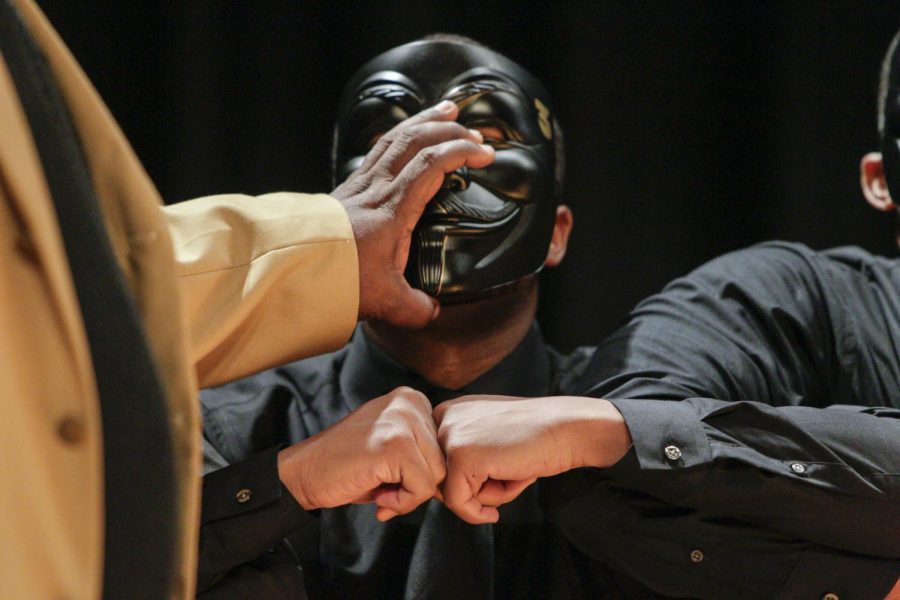Alpha Phi Alpha returns to WKU
April 12, 2016
Divine Nine
Gold mylar balloons in the shape of numbers were brought into Downing Student Union’s auditorium last Wednesday night. The room was almost full from students and adults in attendance, and amplified conversations permeated the space.
At about 7 p.m., the lights dimmed and a line of linked and masked brothers entered through the doorway. The neophyte presentation, also known as probate, for the resurrected Alpha Phi Alpha fraternity had begun.
Alpha Phi Alpha, the first African-American Greek fraternity founded in 1906 at Cornell University, had not been present on WKU’s campus since losing its recognition in fall 2011 following hazing sanctions.
According to graduate assistant student union manager Daniel McDowell, an Alpha Phi Alpha national member from Charlotte, North Carolina, WKU’s Eta Rho chapter was to return next fall. But some interested students met with the grad chapter based out of Fort Knox to persuade them to organize the fraternity back on campus this spring.
The 14 students who now make up the resurrected chapter attended discrete information sessions early on in the semester put on by alumni to teach the fraternity’s history and ways. It is a process characteristic of National Pan-Hellenic Council organizations but not very similar to the Rush Week event the Interfraternity Council and Panhellenic Council organizations use to draw in new members.
Greek Affairs coordinator Alex Kennedy said the NPHC rose in spite of unwelcoming attitudes during the early 20th century.
“Oftentimes in the course of history, the way of subverting a group of people was to diminish or to take away their opportunity for education,” Kennedy said. “The NPHC organizations were founded as a place, as a beacon, for minority students at the time — and I would argue still to today — as a support system to help them through their path to education because education is powerful.”
Brent O’Connor, a junior from Plantation, Florida, is fourth in this semester’s line of 14. His nickname is “Icy Architect,” referencing his major in architectural sciences.
It’s definitely not an easy process. The whole idea is to build lifelong bonds, and so a lot of that involves hard work with whoever else that you are … working with and trying to achieve the same goal as
O’Connor said he had various family members in NPHC organizations, particularly with a history of Alpha men.
He kept checking around campus to see when the chapter would be revived and how he could show further interest and jumped on the opportunity to attend the information session when a social media post went up.
“I was pretty fortunate enough to catch it,” O’Connor said.
McDowell emphasized the importance of showing interest by attending information sessions and making connections with current fraternity members. Because the Eta Rho chapter, as a graduate chapter, was being restarted by alumni, potential undergraduate Alphas had the opportunity to work closely with brothers who were mostly business professionals.
“[The graduate chapter members] definitely gave us a lot of advice about being professional. There are definitely things that have been instilled into us that I’ll take with me for the rest of my life,” O’Connor said. “Waking up early is a big one, [and] being on time … That’s the idea, to develop disciplined individuals that are driven and aren’t ever complacent.”
O’Connor said the process of going through information sessions until members are officially considered happened at the beginning of the spring semester. Notified candidates were then able to practice for their neophyte presentation. The probate included stepping and reciting a plethora of information regarding their fraternity’s founders and history.
“It’s definitely not an easy process. The whole idea is to build lifelong bonds, and so a lot of that involves hard work with whoever else that you are … working with and trying to achieve the same goal as,” O’Connor said. “A lot of studying goes into it, and a lot of spending time together goes into it as well.”
Members’ efforts made for a breathtaking display of synchronized stepping, singing and stating facts about some of the most integral parts of their brotherhood. The audience, filled with Alpha Phi Alpha alumni, other NPHC organizations and members of the community cheered on the men throughout the presentation.
“[It’s] bringing back a positive light of young African-American males really doing something with their life and trying to pursue their education … and trying to get jobs afterwards,” McDowell said.
Kennedy said it’s a big deal to have Alpha Phi Alpha back on campus to round out the rest of the NPHC organizations, who are known as the “Divine Nine.”
“There’s something to be said about having all nine organizations on campus again,” Kennedy said. “All of our NPHC organizations are strong, but the identity that people associate with Alpha is of … prestige.”




















![Megan Inman of Tennessee cries after embracing Drag performer and transgender advocate Jasmine St. James at the 9th Annual WKU Housing and Residence Life Drag Show at Knicely Conference Center on April 4, 2024. “[The community] was so warm and welcoming when I came out, if it wasn’t for the queens I wouldn’t be here,” Inman said.](https://wkuherald.com/wp-content/uploads/2024/04/smith_von_drag_3-600x419.jpg)


